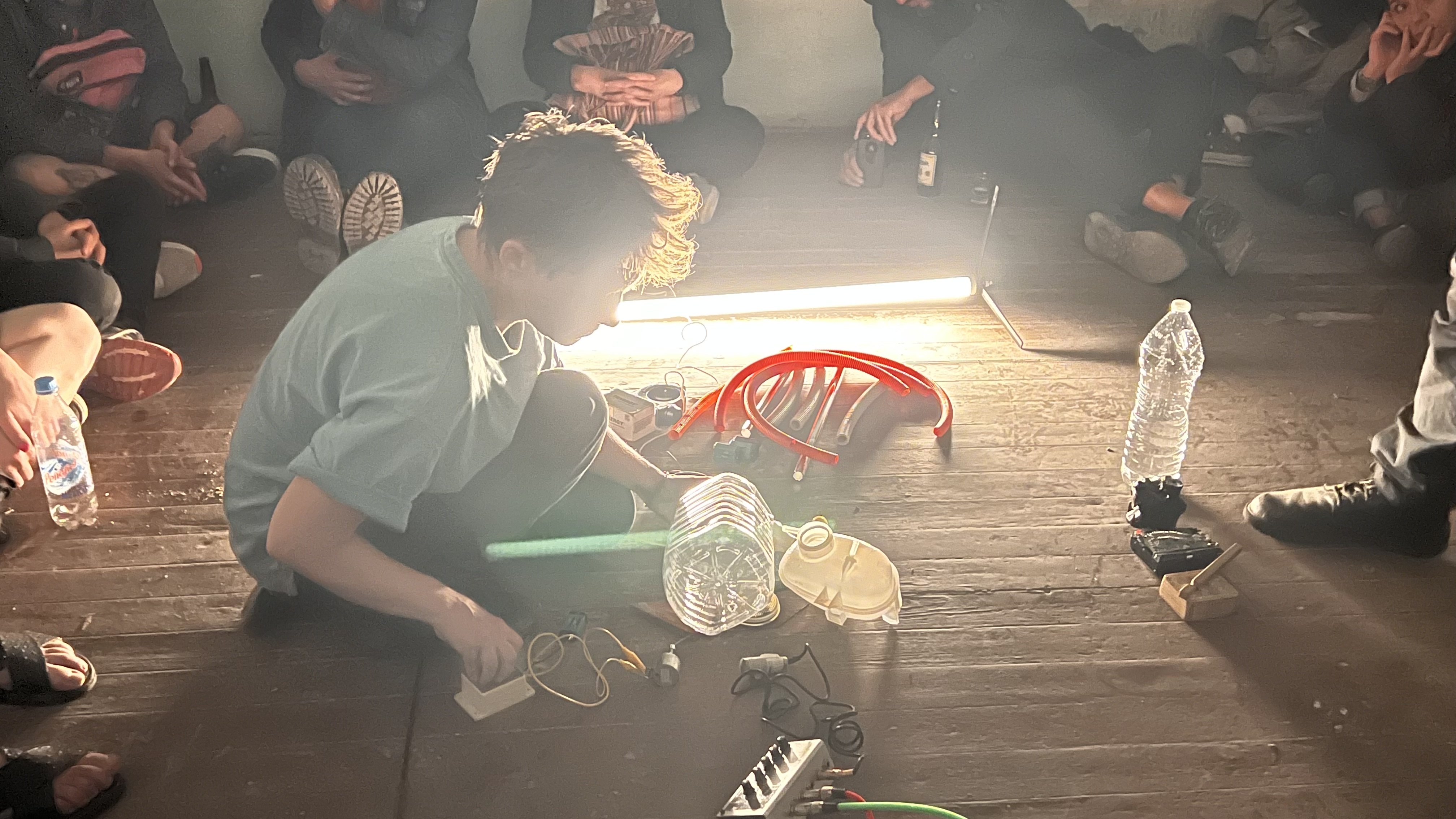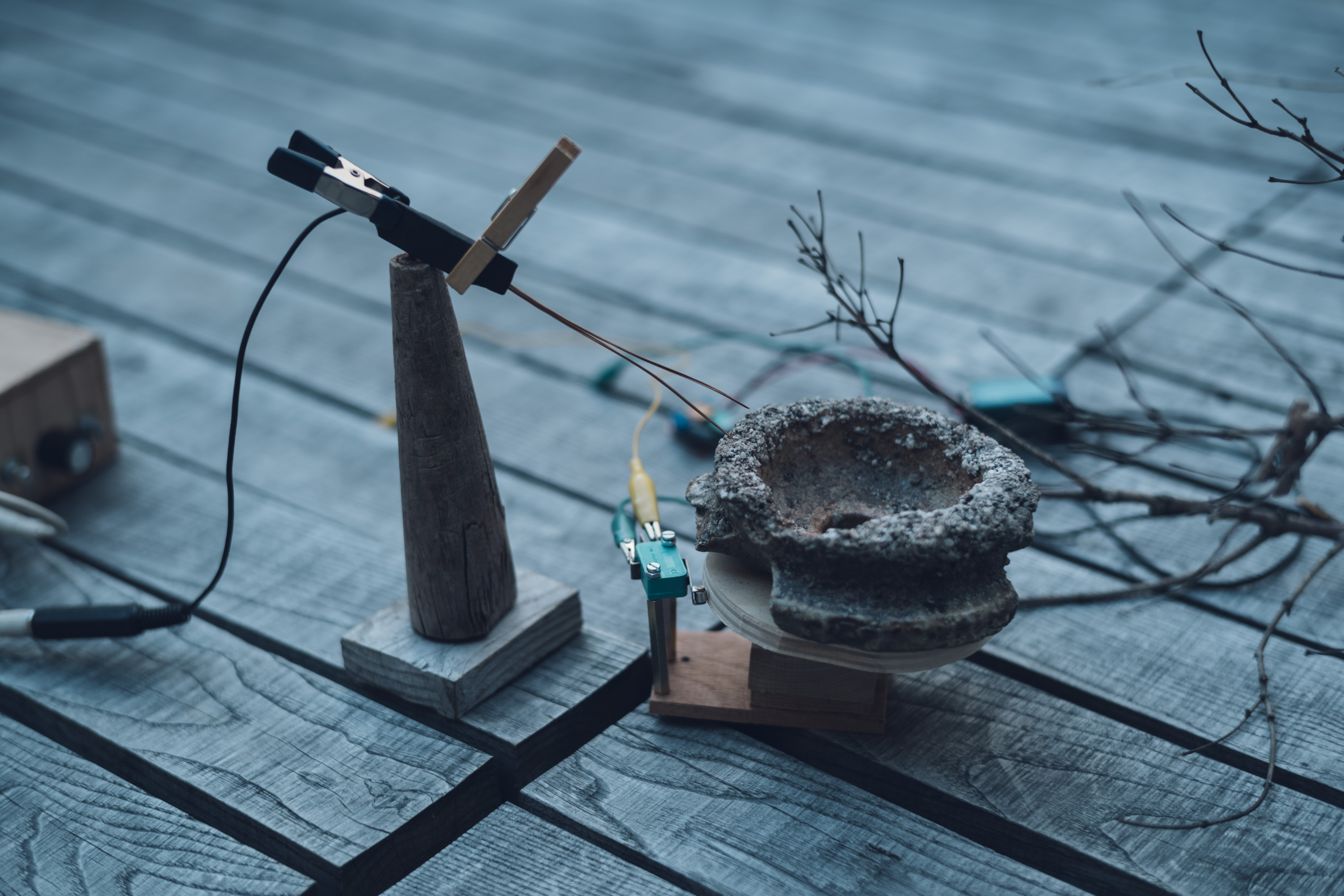Zhu Wenbo interviews Anne-F Jacques by mail during Dec 2023 to Feb 2024.
Z: Please introduce yourself first. How old are you now(2023)? I guess you were born in Montréal, and native language is French, right?
A: I was born in a town called Chicoutimi, 600km northeast of Montreal. Long, long winters. That was 43 years ago, and yes, my native language is french.
Z: Before playing experimental music like nowadays, did you have other music backgrounds? For example most of my friends in China, they more or less have grown from the underground rock scene. Yan Jun wrote music articles in the 1990s, and Li Weisi has been playing bass guitar in rock bands since 2005.
A: I studied (even briefly taught!) clarinet, in a more classical music context. And i very briefly played drums (badly) in some punk-noise projects in the early 2000’s, none of these bands existing for long enough to have a name.
Z: You use some slow rotating self-made stuff as sound gear. Very quiet, but amplify brings magic to their sound. Is there someone who inspired you to do this?
A: Not directly… but my earliest influences in experimental music were Martin Tétreault and Magali Babin, both very active in the improvised experimental scene in Montreal when I moved here. I think I unconsciously kept the rotation from Martin and the extreme amplification of materials from Magali as I developed my set-up.

Z: Do you think there were any different periods in your music creation? Do you think there were any important moments or chances that made you change?
A: Yes, once in a while I seem to change what i play with, which also changes how i play. I was for a long time in a duo called Minibloc, where we manipulated amplified objects, toys, etc. Then I developed my slow rotation set-up, for a moment focusing almost exclusively on rotating rocks. And lately I’m playing with many different kind of things, air blowing through coolant reservoirs, lightbulbs turning on and off, toaster filaments… I’d like to feel like I’m playing directly with forces like air, heat, electricity - and not with some mechanical system. I’m not there yet, but that’s what is pushing me to change.
Z: “playing directly with forces” is really a nice idea, though difficult I guess. Normally how do you choose or select materials? Maybe you could show us an example. And do you collect many materials at home? And is there any materials or objects you always bring on performance?
A: I often choose a material because something about it intrigues me, even before I have any idea of how I will use it; then it can sit for a while in my studio until I find a use for it. Recently I found a broken piece of a composite material, fiberglass maybe, on a beach, and kept it because of its strange shape (it also has a nice color). Then I made a speaker with it. What I bring on performances changes but I seem to always have some lightbulbs with me, and a few rocks.
Z: How do you learn the knowledge of circuit modification? Such as, how do you make a slow rotating stuff? I think there are some motor you could buy on market or remove from some somewhere, but your stuff seems very slow.
A: I’m not so good with electronics, so I try to find other ways to modify the behaviour of the devices I’m using. For very slow motors, I look for some that have a mechanical gearbox (one of my favorite was a windshield wiper motor), and I also play with different ways to attach materials to these motors so that motion will be irregular, often on the verge of stopping.
Z: Another detail on technic. How do you you pick up and amply? Do you use same or different strategies on recording and live? And how do you avoid feedback?
A: For a long time I’ve been using contact mics only, but now I’m using dynamic microphones and handmade magnetic pickups too. It often takes me a lot of time to find a way to amplify certain materials the way I want, and when I find it that’s how I proceed both for performances and recording. These days I work with some small amplifiers that I bring with me everywhere, I don’t go through the main PA anymore; that helps me deal with feedback and also means that I don’t need a mixer, or even a table, I just move around the space with everything on the floor.
Z: For this kind of “no PA style”, Li Song named it as “self-amplify”, an interesting name. I’m surprised that you’re also using this way in live right now. How long has you been doing that? In the azotea actually you also used that method, but I guess to recording it will be very different to live.
A: I agree, ”self-amplify” is a good name for it! I started doing that maybe 3-4 years ago - or to be more exact, I’ve been doing it for a long time but completely stopped using PA about that long ago. It makes me more free to move around and play with the space during the performance. Also, it makes it easier to play with acoustic instruments.
Z: You also did a lot of collaboration with other artists. Normally how do you start a collaboration? Maybe you could talk about your collaboration with Ryoko Akama (who might be your most collaborated with) and Gudinni Cortina (maybe a most recent one I guess?). I felt that they have some similar backgrounds, and do you have any same or different feelings when you were working with them?
A: My favorite collaborations are the ones where what is produced (a release, a performance, etc.) is just a small part of the encounter, and more time is spent discussing, sharing ideas, or talking of totally irrelevant things. So it always starts with a deep fascination with someone’s work, and also just wanting to be their friend. With Ryoko, we’ve actually been stealing each other’s ideas for a few years now: we talk about an idea (for example, use heat to control motion), we each find ways to make it happen, and then we play that together - or not. So the border between the collaboration and our solo work is not that clear, which is interesting to me. With Gudinni, everytime we are in the same geographical space we start playing constantly: touring, playing in his living room, in a backyard, with other people, just playing as much as we can. These collaborations are one of the main things that keeps me engaged with this sound practice, and helps me get rid of the question if my work is good or not - who cares, as long as some people want to make things with me?
Z: I also want to ask the way you doing mastering. I think I was fascinated to your work by your mastering, especially the mastering on tape. I really love the them, because of the sound is very closing and very enveloping. When did you start doing mastering? What kind of equipment or software do you use on mastering? And normally what will you do on the final mix sound?
A: I’ve been sharing a studio space with the same friends since about 2005, one of them is a computer technician and he has installed some very good compression and EQ plug-ins (open source) on our shared computer. So I learned by playing with that, at first I was making everything way too loud and intense, then I calmed down a bit. I love to try and make cassettes sound really good, by going back and forth between the digital and the tape master until I find a sweet spot.
Z: And please tell us about your label presses précaires. You started this label in 2020, before that you run crustacés tapes. Why did you change it? Is there any different strategies of these two labels?
A: crustacés tapes was almost more a conceptual project than a label, as it was impossible to buy a copy of the tapes - they could only be exchanged for a postcard or a gift. I was announcing the release by sending postcards. That was quite fun for a few years, but at some point I realized that it wasn’t super useful for the artists to be on a label that refused to sell their album… and postal costs started making it way too expensive. But I try to keep some of that spirit of exchange with presses précaires, even if it’s a more conventional label.
Z: I found that most of the releases from presses précaires don’t have a long length. Normally 15 mins for one side. Some of them are 25 mins in total or even less than that. I also found that in the past 3 or 4 years, many experimental music cassette are very short, less than 10 mins for one side. What do you think about it? Maybe you tell us about the reasons from your side.
A: Part of the reason is laziness on my part - I duplicate all the tapes myself in real time, so it’s easier if they’re not too long… I think another reason is an interest for a kind of immediacy, having only one project per tape, and releasing it soon after it was recorded.
Z: I also found that you released a lot of Latin American musician’s work. How do you discovered them? To me, a Chinese audience, I think Latin America experimental music scene are very far away. I guess the reason might be the differences from culture, language, geography… but maybe also because Latin America are not in the “center view” of Chinese people. Well, it is really a shame for me to say that, because I have read some novels from South American authors, and I really enjoy listening Victor Jara, Tom Ze, Atahualpa Yupanqui, but I could still feel the culture gap… Anyway, what do you think? I would love to hear your opinion to this topic.
A: One of my interests with presses précaires is actually to release artists mostly from other places than Europe or North America, because I feel that what gets released is just a tiny fraction of the experimental music that’s being made in the world. There’s actually a very active scene in Latin America, with many festivals and radio stations dedicated to sound art in Mexico, Chile, Colombia, Argentina… When I started digging into that, I couldn’t believe how much good stuff is being produced there, and how little we hear about it. Also, I live on the American continent, speaking a latin language - in many ways latin america is much closer to me culturally than europe, for example.
Z: Would you like to tell us your interests beside of music? I guess maybe, stamps? Post card? Handmade stuff? Or some other things?
A: I have a canoe with a sail on it, that’s my main obsession lately. Obviously now all waterways are frozen, so it’s winter biking while waiting for spring.
Z: Do you have plans in 2024 and future days?
A: ….going to china maybe? I don’t know yet, I have more dreams than solid plans for the moment.
关于Anne-F Jacques
Anne-F Jacques 住在加拿大蒙特利尔。她对声音的放大、材料之间通过倾斜发生的相互作用,以及各种装置和特殊系统的构造感兴趣。她特别关注低科技、琐碎的物体和未经修饰的声音。
https://anne-fjacques.bandcamp.com/
Anne-F Jacques 在燥眠夜出版过两张专辑。2021年,她参与了《飘浮的磁带 第二章》,这张磁带由她和阿根廷音乐人Bardo Todol演奏录制,德国音乐人Chemiefaserwerk对声音素材进行编辑与混音。以及2023年的一张split磁带,一面是Anne-F和墨西哥音乐人Gudinni Cortina的二重奏《屋顶azotea》,在墨西哥城的一个户外屋顶录制;磁带的另一面是李维思的个人作品《我与房间》。
尽管从来没有来过中国,但Anne-F Jacques和中国的实验音乐人有过很多的联动。2020年她开始运作自己的磁带厂牌presses précaires(不稳定的压力机),出版的第一张专辑是赵丛的独奏《fog and fragments》。此后这个厂牌也出版了其他中国音乐人的作品,包括朱文博参与混音的《飘浮的磁带 第一章》,阿部薰没有未来的《路又走错一条》,李松和卓梦婷的二重奏《two rooms》。
对了,在2020年的“密集音乐会66”里也收录了她的三个作曲。使用纸张、铅笔、塑料泡沫,没有任何技巧,任何人都可以演奏,在任何地方都可以演奏。但于此同时也可以想象,如果是她自己来演奏并进行扩音,那一定又会有一些不同。
朱文博一直很希望在中文世界里介绍Anne-F Jacques的音乐。借《屋顶azotea》出版的契机,他和Anne-F进行了一次邮件采访。两人的邮件从2023年12月一直持续到2024年2月。以下是采访正文。
朱:请先来介绍一下你自己吧。你今年(2023)多大?我猜你的母语是法语,出生在蒙特利尔,对吗?
雅克:我出生的城镇是希库蒂米(Chicoutimi),蒙特利尔往东北600公里吧,那里有很长很长的冬天。是的,我的母语是法语。我今年43岁。
朱:在做现在的这种实验音乐之前,你有过别的音乐背景吗?比如我在中国的这些朋友,他们多多少少都是从地下摇滚这个场景里过来的。颜峻在90年代的时候写音乐类的文章,李维思从2005年开始一直在摇滚乐队里弹贝斯。
雅克:我学过(甚至还简单教过!)单簧管,是在一个更偏古典音乐的学校里。2000年初的时候我在一些朋克-噪音的项目里打打鼓(很差),这些乐队的存在时间都没能长到需要有一个名字。
朱:你使用的器材是一些缓慢旋转的自制设备。尽管很安静,但是声音的放大给它们带来了魔力。有谁影响了你来做这些?
雅克:虽然不是很直接……不过我的早期实验音乐影响是来自Martin Tétreault和Magali Babin。在我刚搬来蒙特利尔的时候他们都是这里即兴实验音乐场景里很活跃的人。我想在我开发我自己的设备时,我无意中保留了Martin的旋转和Magali对于材料的极端放大。
朱:你觉得在你的音乐创作中存在有一些不同的时期吗?你觉得是否有那么一些重要的时刻或机缘为你带来了改变?
雅克:是的,有时我可能会改变我演奏的东西,然后也就改变了我的演奏方式。我在一个名为 Minibloc 的二人组中呆了很长一段时间,那时候我们操控那些扩音物件,玩具什么。后来我开发了我的慢速旋转装置,有一段时间几乎完全专注于旋转的石头。最近我在用很多不同类型的东西,用空气吹冷却剂储罐,灯泡打开关闭,烤面包机的灯丝… 有一个感觉我是在直接演奏空气、热、电这些动力,而不是机械系统。虽然我还没能做到这一点,但它促使我去改变。

朱:“直接演奏动力”真是个挺厉害的想法,虽然应该也很难吧!通常你是怎样来选择材料的?你可以给我们举个例子。还有就是,你会在家里存放很多材料吗?有没有哪些材料或者是物件你总会带去演出的?
雅克:我经常选择某种材料是因为它的某些东西吸引了我,在这个时候我甚至可能不知道该如何使用它。然后它可能会在我的工作室里存放一段时间,直到我找到使用它的方式。最近,我在海滩上发现了一块复合材料的碎片,可能是玻璃纤维,因为它的奇怪形状而保留了它(当然它的颜色也很漂亮)。后来我用它做了一个扬声器。我带去演出的东西总会变,但我似乎总会带一些灯泡和石头。
朱:你是怎样来学习电路改造知识的?就比如,你是怎样来弄出一个慢速旋转的东西的?我知道一些马达是可以从市场上买到,或者是从某个地方拆下来,但你的这些东西是真的很慢。
雅克:我对电路并不精通。所以我试着找到其它的方式来改变我的设备的运行。比如这些非常慢的马达,我是找了一些具有机械变速箱的马达(我最喜欢的一种来自于挡风玻璃的刮水器),此外我还会把不同的材料附着在马达上,这样运动就会很不规律,经常处于停止的边缘。
朱:另一个关于技术方面的细节。你是怎样做拾音和放大的?在录音和现场中,你是用同样的策略吗?你又是怎样来避免回授的?
雅克:很长一段时间我就是用接触麦克风。不过现在我也用动圈麦克风和手工制作的电磁拾音器。我经常要花很长时间来给一种特定的材料找到我希望的扩音方式,一旦找到了我在现场演出和录音中就都会使用。如今我会随身带一些小的扩音器,不再用场地的主PA了。这样就避免了回授的问题,同时也意味着我不需要一个调音台,甚至也不需要桌子。我把东西放在地上,在空间里移动。
朱:这种“不使用PA”的方式,李松将其称之为“自放大(self-amplify)”,挺有意思的说法。我很意外你现在也在现场使用这样的方式。你这样做多久了?在《azotea》这个录音中事实上你也是用了这样的方式,但我猜在录音中这种方式和现场是很不一样的。
雅克:我同意,“自放大”是一个好名字。我是从三四年前开始这样做的,或者再具体一些,我已经这样做很久了但是在三四年前我不再使用PA系统了。这样我可以在表演中更自由的移动。这样的方式也会更方便的使用原声乐器。
朱:你和很多艺术家有过合作。通常你是怎样开始一次合作的?比如你可以讲讲你和Ryoko Akama还有Gudinni Cortina的合作?前者应该是你合作最多的人,后者可能是你最近的合作。我感觉他们有一些相似的背景,不过在你与他们合作的过程中,你会有什么不一样的感受吗?
雅克:我很喜欢的那些合作经历里,最终的产物(比如一个出版,一个演出……)只是其中的一小部分,更多时间花在了讨论,分享想法,以及谈论那些不相关的事情。所以通常是从非常喜欢某个人的作品开始的,并想和对方交朋友。关于Ryoko,这些年里我们一直在互相偷对方的想法:我们会谈论一个想法(例如,用热量来控制运动),我们彼此都找到了方式实现了这个想法,之后我们一起演出,也可能没有。于是合作作品与个人作品的边界就很不清晰,这让我很感兴趣。关于Gudinni,每一次我们在同一个物理空间的时候,我们都会不断地演奏:巡演,在他的客厅演奏,在某个后院演奏,和其他人一起演奏,尽可能多地演。这些合作是我参与这种声音实践的主要因素之一,并帮助我摆脱了我的作品好不好的问题——只要有人想和我一起做东西,谁在乎呢?
朱:我也想问问你做母带的方式。我想我是通过你的母带处理进而迷上了你的作品的,尤其是实体磁带的母带处理。我非常喜欢它们,因为声音非常近,非常有包裹性。你是从什么时候开始做母带的?你用什么样的设备或软件?通常你都会对于最终混音的文件做一些什么?
雅克:自2005年开始,我一直和一些朋友共用一个工作室空间。其中一个人是电脑高手,他给我们共用的电脑装了一些很好的压缩和EQ插件(都是开源的)。于是我就学着用。一开始我把所有的声音都弄的很大声很紧实,后来我冷静了一些。我喜欢在数字和磁带母带之间来来回回反复试,直到把磁带的声音调到特别好。
朱:也请讲讲你的厂牌,presses précaires(不稳定的压力机)。你是2020年开始做这个厂牌的,之前的厂牌是crustacés tapes(贝壳磁带)。为什么要换一个厂牌?这两个厂牌之间有什么不同的策略吗?
雅克:贝壳磁带更像是一个概念性计划,而不是厂牌。因为这些磁带你没办法买,只能通过明信片或者礼物来交换。我通过寄明信片的方式来公布一个出版。有那么几年挺好玩的,不过有时候我也意识到,对于艺术家来说如果一个厂牌拒绝卖他们的专辑,这也不是很有用吧…… 然后邮费也变太贵了。不过我把交换的精神也留在了不稳定的压力机当中,即使它是一个更传统的厂牌。
朱:我发现大多数不稳定的压力机的发行通常都不长。通常一面15分钟左右,有一些两面总长才25分钟,甚至可能还更短一些。同时我也发现,在最近三四年里,很多实验音乐的磁带都非常短,一面不到10分钟。你对此怎么看?或许你可以说说你这边的原因。
雅克:从我这边来说,一部分原因是懒吧。我的磁带都是我自己同倍速复制的,所以如果它们短一些会让我更容易…… 另一个原因是一种对于即时性的兴趣。每个磁带都是一个项目,录完就发。
朱:我也注意到你出版了很多拉丁美洲音乐人到作品。你是怎么发现他们的?对于我一个中国听众来说,拉丁美洲的实验音乐场景真的够远的。我猜可能是因为文化/语言/地理这些方面的差异,但也可能是因为,对于中国人来说,拉丁美洲真的不在视野的中心地带。这么说真的让我觉得很羞耻,因为我其实也读过一些南美作家的小说,我也很喜欢Victor Jara, Tom Ze, Atahualpa Yupanqui的音乐,但我依然能感受到这种文化方面的鸿沟。总之吧,你是怎么想的?我想听听你的看法。
雅克:不稳定的压力机之于我的兴趣之一其实就是出版那些在欧洲和北美之外的艺术家的作品,因为我觉得,得到出版的实验音乐其实只占全世界被创作的实验音乐的一小部分。事实上在拉丁美洲有一个非常活跃的场景,在墨西哥、智利、哥伦比亚、阿根廷,有很多的音乐节和关于声音艺术的广播电台。一旦我开始挖掘,简直不敢相信那边制作了多少好东西,以及我们对那边听过的是有多么少。另外,我住在美洲大陆,说一种拉丁语系的语言,相比较欧洲来说,很多层面上拉丁美洲对我而言在文化方面更亲近。
朱:在音乐之外你有怎样的兴趣?我猜可能是,印章?明信片?手工制作?还有啥别的吗?
雅克:我有一条带帆的独木舟,这是我最近最主要的兴趣。很明显现在水道都冻冰了,所以现在的兴趣是冬季骑行,等着春天呢。
朱:你2024年以及之后有什么计划吗?
雅克:…… 来中国看看?我也不知道哦,目前我的梦想比实际计划要多。
